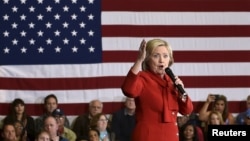With five days to go before Nevada's Democratic caucus, party front-runner candidate Hillary Clinton is emphasizing that she is more than a "single issue" candidate as she tries to fend off opponent Bernie Sanders, with whom she is running virtually neck and neck. In a national poll by Quinnipiac University, the former secretary of state leads the Vermont senator 44 percent to 42 percent.
The Clinton campaign sees multi-ethnic Nevada as a key test of her pull with minority and union voters. For Vermont Senator Bernie Sanders, the western state presents a demographic opportunity to expand his electoral viability nationwide after his success in the low-minority states of Iowa and New Hampshire. Nevada has a 40 percent non-white electorate.
In a campaign speech Saturday in Henderson, Nevada, Clinton attacked Sanders as a one issue candidate.
“Not everything is about an economic theory, right?” Clinton said. She went on to list sexism, LGBT discrimination and immigrants’ rights as key issues not addressed by Sanders’ emphasis on the power of Wall Street and big banks.
Sanders has made an appeal to union voters a crucial part of his push in the state, repeatedly mentioning on the campaign trail that union members are broadly behind him. The Culinary Workers’ Union is a major force in the state caucus but has not yet endorsed a candidate. Sanders' campaign has argued that his history of activism and background as the son of an immigrant will appeal to the state’s Latino voters.
The Clinton campaign has had a presence in Nevada since April 2015 and is counting on the strength of its efforts with seven state offices and more than 7,000 volunteers. The Sanders campaign has 12 state offices and says it has “several thousand” volunteers.
The Nevada Democratic caucus on Saturday, February 20 will come just one week before the South Carolina primary. Nevada's Democratic Party encourages participation by allowing shift workers such as casino and food service employees to register on the day of the caucus and participate at any caucus site. Analysts say the unusual nature of the caucus and the state’s transient population are two factors that could impact the results.
Clinton narrowly beat Sanders in the Iowa caucus but lost to him by a large margin in the New Hampshire primary.






